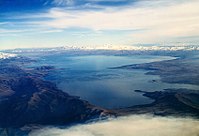
Photo from wikipedia
Abstract In eutrophic lakes, macrophytes can improve water quality through their uptake of excess nutrients and by stimulating microorganism activity, particularly for nitrogen (through nitrification and denitrification). However, some adverse… Click to show full abstract
Abstract In eutrophic lakes, macrophytes can improve water quality through their uptake of excess nutrients and by stimulating microorganism activity, particularly for nitrogen (through nitrification and denitrification). However, some adverse effects of macrophytes are of concern, including accumulation of sedimentary organic carbon, decreasing dissolved oxygen concentration, and increasing greenhouse gas emissions. Accordingly, restoration of macrophytes in littoral zones should consider the overall effects of macrophytes on the surrounding environment. Here, the effects of emergent macrophytes on water quality, sedimentary organic carbon characteristics, and greenhouse gas emissions were investigated in a eutrophic lake (Lake Hachiro, Japan). Field surveys were conducted both inside and outside nine emergent macrophyte zones in July and November 2017; the results demonstrated no significant differences in oxygen concentration, sedimentary organic carbon accumulation, or fatty acid biomarker profiles over the surveyed period. This indicates that emergent macrophytes had no detrimental effects on the benthic environment of Lake Hachiro. In addition, significant reduction in nitrate concentration was confirmed in the artificially restored Zizania latifolia community based on a field chamber experiment. This was likely associated with increased microbial activity, as evidenced by the contemporaneous observation of increased emissions of N2O gas (a byproduct of denitrification and nitrification processes) inside the areas with vegetation cover. The N2O gas emissions observed here were considerably lower than those reported previously for wastewater treatment facilities (e.g., constructed wetlands). This study demonstrates that restoring macrophytes did not have a negative influence on the benthic environment in this eutrophic lake. Elucidating the mechanisms underlying this lack of degradation of benthic conditions will help ensure that future restoration of macrophyte cover can be undertaken in the littoral zones of eutrophic lakes without any corresponding detrimental impacts.
Journal Title: Ecological Engineering
Year Published: 2020
Link to full text (if available)
Share on Social Media: Sign Up to like & get
recommendations!